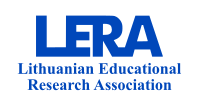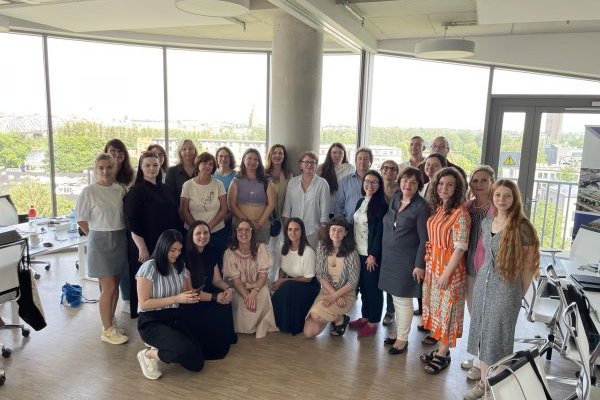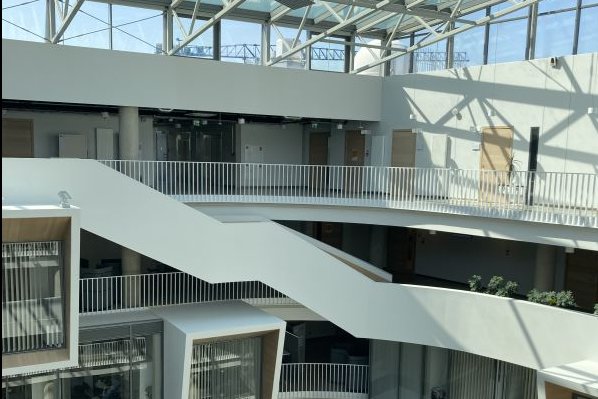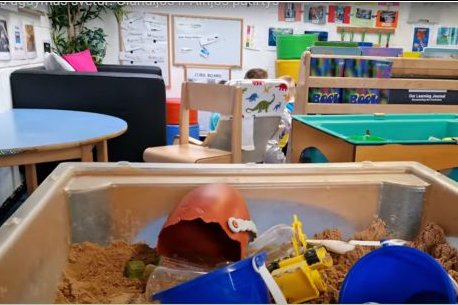LERA President dr. Eglė Pranckūnienė’s announcement “The Paradigm of Free Education: Are We ploughing on or Are We Irreversibly Moving Away?”
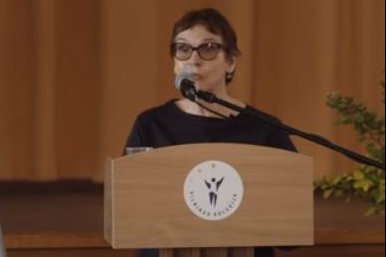
On the 8th of May in 2024, a conference “Crossroads and Labyrinths of Educational Reforms” dedicated to Meilė Lukšienė took place at Vilnius College.
The idea of the conference was to share ideas on the importance of national identity, language education, and preservation, how to reconcile global and national, how to achieve educational harmony from kindergarten to senior classes?
Dr. Eglė Pranckūnienė, (Head of the School Improvement Centre, Researcher at KU, President of LERA) presented an announcement “The Paradigm of Free Education: Are We Ploughing on or Are We Irreversibly Moving Away?”
The full announcement: here
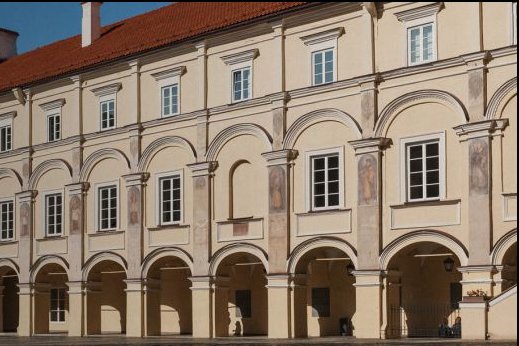
The International Conference “9th International Scientific Conference on Linguistic, Educational, and Intercultural Research 2024”
Vilnius University and the Language Teachers Association of Lithuania (LKPA) are pleased to announce the 9th International Scientific Conference on Linguistic, Educational, and Intercultural Research (LEIC Research 2024).
Set to take place on November 7th and 8th 2024, this conference marks a significant milestone as it coincides with the 25th Anniversary of the Institute of Foreign Languages, a co-founder of LKPA.
This conference will be held both as a hybrid event, allowing for virtual participation, and onsite for those attending in person.
Conference themes:
• Linguistic Research: Cognitive Linguistics, Sociolinguistics, Pragmatics, Corpus Linguistics, Lexicology, Meta-lexicography, Discourse studies/ Language in the Media, Public and other Types of Discourse
• Language Teaching, Learning & Innovation: Language Acquisition, Language Testing and Assessment, Language Teacher Education, Language Teaching Methodology, Online Language Teaching and Testing, Language Curriculum Development and Syllabus Design
• Language Policy: Multilingualism, Languages and Rights, Minority and Regional Languages
• Intercultural Education and Research
• Literary Research
Important dates and registration fees
Rolling abstract submission: 15 September 2024*
Notification of acceptance of abstracts: 30 September 2024
Article submission: 1 October 2024
Acceptance of articles: 22 October 2024
Conference dates: 7–8 November 2024
*early submission is encouraged!
Presenter’s fee: €100
Online presenter’s fee: €50
Non-presenter’s participation fee: €10
Reception dinner fee (optional): €40 (by 25 October 2024)
Late registration fee: €120 (after 8 October 2024)
Arqus European University Alliance Presenter’s fee: €50
Arqus European University Alliance Online Presenter’s fee: €25
Please transfer the Conference fees by 7 October 2024.
For more information : https://www.leicresearch2024.flf.vu.lt/about
Information of Vilnius University Institute of Foreign Languages

Congratulations to the new dr. Rui Li on successfully defending his PhD thesis “Promoting self-regulation in music teacher education: challenges and opportunities” (Education(S 007)), and acqiuring PhD in the field of Social Sciences, majoring in Education. The scientific supervisor – Rasa Kirliauskienė (Vytautas Magnus University, Social Sciences, Education , S 007).
The dissertation is available at: Vytautas Magnus University and Lithuanian National M. Mažvydas Library.
The dissertation is available at: 11, Studentų St. Academia, district Kaunas
A short annotation of the dissertation is presented below.
The aim of the study is to reveal the characteristics and importance of promoting self-regulation through the challenges and opportunities of preservice music teacher education (with a particular focus on piano). Although scholarly sources analyse the self-regulation of future music teachers and its importance, the analysis of individual aspects often does not reveal the full manifestation of self-regulation in music teacher education. This dissertation aims to provide a theoretical basis for the promotion of self-regulation in the educational process of future music teachers. Using a mixed-methods research approach, it reveals the peculiarities of promoting self-regulation in the process of music teacher education. Self-knowledge and self-positioning, self-knowledge in the educational process, experiences and challenges related to self-knowledge in the educational process, acquired self-regulation skills, and the application of self-regulation among Chinese and Lithuanian prospective music teachers are assessed. Our study revealed that there is a distinct lack of structured scholarly resources on effective self-regulation and stress management strategies, particularly as applied in music teacher education programmes and educational documents.
The dissertation consists of four parts. Part I provides a multifaceted analysis of self-regulation theory, highlighting the importance of preparation and experience for self-regulation, and examining the impact of self-confidence and personality traits on self-regulation. Part II explores the essential roles of music teachers, using the piano – the main instrument of music teacher training – as an example, describing the necessary skills for future music teachers. The psychological aspects, problems and solutions to the acquisition of the skills of future music teachers are discussed in detail. Part III discusses the methodology of the study on the promotion of self-regulation of future music teachers, including methodological approaches, ethical principles, research methods, selection of participants, etc. Part IV analyses the results of the research and suggests promising problems and solutions in the field of future music teacher education. In addition, some solutions to the problems of the training of future music teachers are presented from the perspectives of education and intercultural education.
Dissertation Defence Council:
Chair – prof. dr. Remigijus Bubnys, Social Sciences, Education S 007, Vilnius University, Šiauliai Academy.
Prof. dr. Jelena Davidova, Social Sciences, Education S 007, University of Daugavpils,
Prof. dr. Alvyra Galkienė, Social Sciences, Education S 007, Vytautas Magnus University, Academy of Education,
prof. dr. Asta Rauduvaitė, social sciences, education S 007, Vytautas Magnus University, Academy of Education,
Assoc. prof. dr. Emilija Alma Sakadolskis, Social Sciences, Education S 007, Vytautas Magnus University, Academy of Education.

Congratulations to the new doctor Maria Jose De Urraxa on the successful defend5ng of her PhD thesis on “Personalisation in Education for Learner Empowerment” (Education Science (S 007)) and acquiring degree of Social Sciences in the field of Education. The scientific supervisor – prof. dr. Lina Kaminskienė (Vytautas Magnus University), scientific advisor – prof. dr. Erno Lehtinen (Turku University).
The dissertation is available at the Vytautas Magnus University and the Lithuanian National M. Mažvydas Library.
The dissertation is available at: 11 Studentų St. Academia, Kaunas d5strict.
A brief annotation of the dissertation is presented below.
Personalisation in education refers to a shift from a teacher-centred to a student-centred approach (Camps-Bansell, 2018), emphasising the active role of students in the learning process (Chocarro et al., 2007; Deed et al., 2014; Coll, 2015). Research on this topic clearly shows that the personalisation process in education requires empowering student agency (Coll, 2015), but the basis for this is unclear. Therefore, this study aimed to investigate the essential components of personalisation in education through teachers’ and learners’ experiences of personalisation and the associated shared expressions of learners’ personal agency.
The methodological approach used in this research work is a methodology based on both quantitative and qualitative research. A sequential explanatory design was applied, involving a two-phase exploratory work. The philosophical model used is critical realism (Bhaskar et al., 1998; Archer, 1998). The quantitative research involved a teacher survey designed by the author and the qualitative research involved observations and interviews in three schools. The results suggest that teachers are trying to personalise learning, although contextual constraints such as large class sizes and the demands of standardised examinations are challenges that make it difficult to fully personalise learning. The results of the qualitative study show that learners’ internal barriers influence communication and conformity preference inhibits their personal agency in the learning process, leading to depersonalisation dynamics.
The study concludes that the personalisation of education as a process requires collaboration between teachers and learners, and the active participation of learners is essential. The practice of personalisation in education has a common theoretical framework, based on anthropological foundations, which allows the application of personalisation as an educational principle. This provides a basis for future research and pedagogical innovation.

On the 26 of June, 2024, the XXXIV Education Forum-Discussion “What to Expect from Doctoral Studies?” was held. The Forum-Discussion addressed the following questions:
- Why choose a PhD?
- What to expect from PhD studies?
- What are the challenges of doing a PhD?
- How to write a PhD thesis in 4 years?
- How to get a PhD
Viktorija Voidogaitė (PhD student at VU Institute of Educational Sciences), Daiva Bartnikienė (PhD student at VMU Academy of Education), Danguolė Šakalytė (PhD student at MRU Faculty of Human and Society Studies), Brigita Miseliūnaitė (PhD student at KTU Doctor of Educational Studies) shared their experience and insights. The forum-discussion was moderated by doctoral student Vaiva Juškienė (LERA Doctoral Student Network Chair).
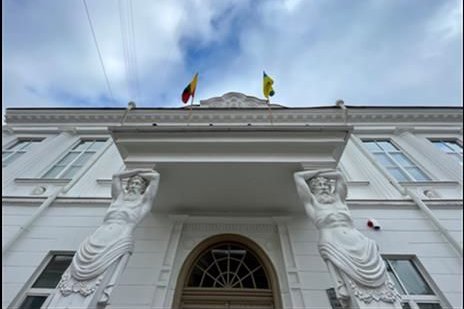
LERA 2024 Conference “Education Uncertainty and Communication Challenges: the Intersection of Past and Future”
We are kindly remind and invite education practitioners, education researchers, masters students, doctoral students, university lecturers, education and social policy makers, representatives of scientific associations and non-governmental organisations, and all those who are interested in educational research to participate in the 8th Lithuanian Educational Research Association (LERA) conference “Education Uncertainty and Communication Challenges: The Intersection of Past and Future”, which will be held on 17 and 18 October 2024 and will take place at the Faculty of Creative Industries of Vilnius Gediminas Technical University ( 1 Trakų St, 01132 Vilnius).
The variety and abundance of technologies and communication channels raises many questions for education: what and how to teach? How much technology should be included in the educational process? How to engage learners? how to prepare children and young people for the future? how to develop personality? how to communicate? These and similar questions will be addressed during the LERA 2024 conference. The conference will also explore the phenomenon of educational uncertainty and the challenges of communication at the intersection of past and future.
The first day of the conference (17 October) is dedicated to plenary presentations, scientific debates and other general activities. The proceedings will take place at the Faculty of Creative Industries of Vilnius Gediminas Technical University (1 Trakų St., 01132 Vilnius). The second day of the conference (18 October) will be dedicated to breakout sessions. The breakout sessions are planned in two sessions of 1.5 hours each, with oral and poster presentations and discussions. Filming and photography will be available during the event. The deadline for registering for the conference with a paper and, if necessary, adjusting the title of the paper is 30 September 2024. For participants without a presentation, the deadline for registration is 14 October 2024.
Preliminary conference programme: here
Registration link: here

XXIV EDUCATION FORUM
EDUCATION FOR LITHUANIA – RESEARCH-BASED EDUCATION
TOWARDS RESEARCH-BASED EDUCATION AND TRAINING
Discussion
“What to expect from doctoral studies?”
We kindly remind you that the Educational Forum-Discussion “What to Expect from Doctoral Studies?” will be held on Wednesday, June 26, 2024, 3pm–4pm.
We are kindly invite all those who are interested in doctoral studies in education and are planning to enrol in doctoral studies, as well as those who are already studying and would like to share their experiences.
| Date | 26th of June (Wednesday),2024 |
| Time | 3.00–4.00 p.m. |
| Broadcasting | Zoom: https://liedm.zoom.us/j/97053246249 |
| Moderators | Vaiva Juškienė, Chair of LERA Doctoral Student Network |
|
Questions considered in the forum- discussion:
|
1.Why choose PhD studies? 2.What to expect from doctoral studies? 3.What are the challenges of studying? 4.How to write a PhD thesis in 4 years? 5. Networks of doctoral students |
| Panelists | Viktorija Voidogaitė, doctoral student of VU Institute of Educational Sciences Kęstutis Vaišnora, doctoral student of VMU Education Academy Daiva Bartnikienė, doctoral student of VMU Academy of Education Danguolė Šakalytė, MRU PhD student at the Faculty of Human and Society Studies Brigita Miseliūnaitė, doctoral student in KTU education |
Organizing Committee of the XXXIV Education Forum
Vaiva Juškienė, chairof the LERA doctoral student network, doctoral student at the Faculty of Human and Society Studies at MRU
Kęstutis Vaišnora, chair of the LERA inclusive education network, doctoral student of the VDU Academy of Education
Viktorija Voidogaitė, doctoral student of VU Institute of Educational Sciences
Daiva Bartnikienė, doctoral student of VMU Academy of Education
Danguolė Šakalytė, MRU PhD student at the Faculty of Human and Society Studies
Jurgita Bagdonaitė, doctoral student of the VU Institute of Educational Sciences
Monika Šimkutė – Bukantė, doctoral student of VMU Education Academy
Registration until June 23. https://forms.gle/nCrMMeonWxeTyktq6
Contact information :
Vaiva Juškienė, [email protected]
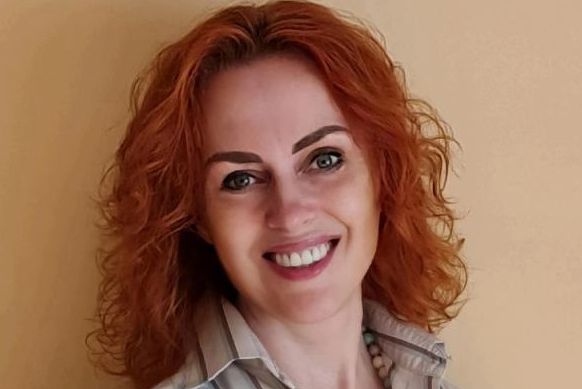
Congratulations to the new doctor Jūratė Litvinaitė on successfully defending her PhD thesis “Teachers and Their Professional Practices in the New Educational Contexts” (Sociology (S 005), supervisor – prof. dr. Arūnas Poviliūnas (Vilnius University, Social Sciences, Sociology – S 005)) and on obtaining her Doctor of Sociology in the field of Social Sciences.
The dissertation is available at the Vilnius University Library and on the VU website at: https://www.vu.lt/naujienos/ivykiu-kalendorius
A short annotation is presented below.
21st century teachers’ dissatisfaction with their work is increasing, the number of teachers leaving school is growing, and the number of teachers who want to become teachers is decreasing. These facts inspired the dissertation research. Based on P. Bourdieu’s theories of social practice and postcolonialism (H.K. Bhabha’s concept of the Third Space), an analytical tool was constructed, adapted to examine historical and current contexts that significantly affect teachers and their practices. Current contexts in the dissertation are called New educational contexts, arguing that their formation is significantly influenced by policies based on neoliberalism and neoconservatism and the program of the Fourth Industrial Revolution. The theoretical analysis of contexts, teachers’ habitus and their practices is extended by empirical research. It was attended by 47 teachers of various experience from all over Lithuania. The applied photovoice method helped teachers construct authentic narratives about themselves and their practices. The collected abundant material reveals in detail the field of school education and the different experiences of teachers. The data reveal that education as a public service is being deconstructed, teachers are being deprofessionalized; the school field of education loses its autonomy, turns into a machine. In such conditions, teachers of various habitus construct new action strategies. Teachers who manage to create a Third Space with other field agents retain an interest in remaining in the school educational field.
Dissertation Defense Council:
Chair – prof. dr. Lilija Duoblienė (Vilnius University, social sciences, education – S 007);
prof. dr. Irena Juozeliūnienė (Vilnius University, social sciences, sociology – S 005);
prof. dr. Lina Markauskaitė (University of Sydney, Australia, social sciences, education – S 007);
prof. dr. Natalija Mažeikienė (Vytautas the Great University, social sciences, education – S 007);
prof. hab. dr. Zenonas Norkus (Vilnius University, social sciences, sociology – S 005).
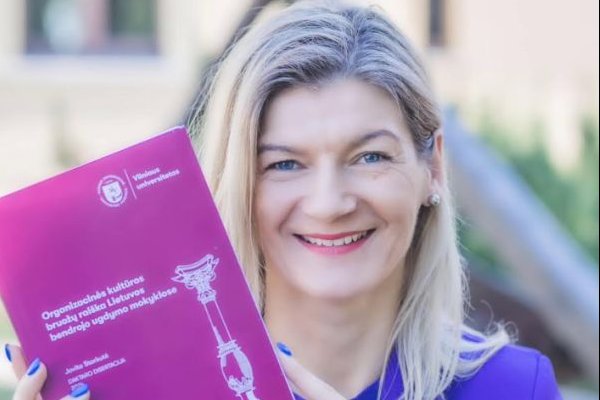
Congratulations to the new doctor Jovita Starkutė on the successful defence of her doctoral thesis “The Expression of Organisational Culture Traits in Lithuanian General Education Schools” (Edukologija (S 007)), supervisor – prof. habil. dr. Rimantas Želvys (Vilnius University, Social Sciences, Educational Science, S 007; supervised from 07-12-2022 to 07-08-2023). Supervisor – prof. dr. Aušrinė Gumuliauskienė (Vilnius University, Social Sciences, Educational Sciences, S 007; supervised from 2011-10-01 to 2022-12-06)), and acquiring the degree of Doctor of Social Sciences in Education Field.
The dissertation is available at Vilnius University, Klaipėda University, Mykolas Romeris University, Kaunas University of Technology, Kaunas University of Technology, Lithuanian University of Sport, and on the website of Vilnius University at: www.vu.lt/lt/naujienos/ivykiu-kalendorius
A short annotation is presented below.
The relevance of the topic of the dissertation and the necessity of its research is primarily related to the theoretical problems caused by the differences in the identification of the features of organisational culture, which led to a practical problem – there is no clear, practically applicable organisational culture instrument for educational institutions and the identification of the features of organisational culture, which would enable an organisation to diagnose, create and develop the existing organisational culture and initiate changes in the existing culture. Therefore, the study aims to analyse and systematise the features of organisational culture and the indicators that support them, and to apply the chosen research instrument to educational institutions.
The object of the study is the expression of organisational culture traits. The aim of the study is to reveal the expression of organisational culture traits in Lithuanian general education organisations. The primary research data used in the study of the expression of organisational culture traits in Lithuanian general education schools allows for a deeper understanding of the organisational culture in the country by looking for a systematic approach and the integration of the traits into other processes and the overall activity of the educational institution. This work is one of the first studies in the field of organisational culture in Lithuania, answering the hitherto under-researched question: what is the organisational culture in Lithuanian general education schools? What are the characteristics of organisational culture that can be used to create or develop organisational culture in Lithuanian educational institutions?
Dissertation Defence Council:
Chair – prof. dr. Renata Bilbokaitė (Vilnius University, Social Sciences, Education – S 007).
Members:
Prof. dr. Liudvika Leišytė (University of Dortmund, Germany, Social Sciences, Education – S 007),
Prof. dr. Daiva Malinauskienė (Vilnius University, Social Sciences, Education – S 007),
Prof. dr. Odeta Merfeldaitė (Mykolas Romeris University, Social Sciences, Education – S 007),
Assoc. prof. dr. Irena Stonkuvienė (Vilnius University, Social Sciences, Education – S 007).
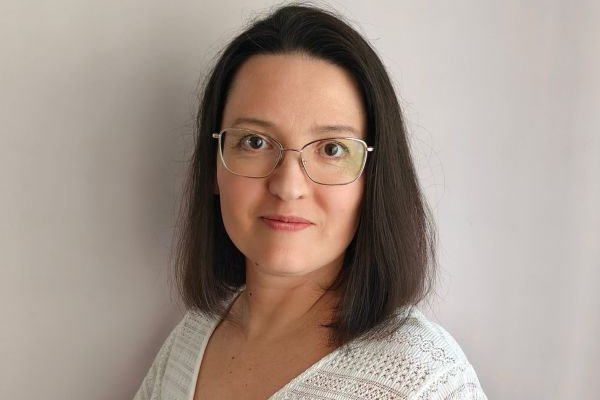
Congratulations to the new doctor Jelena Vildžiūnienė on the successful defence of her doctoral dissertation “The Effect of Pedagogical Strategies on the Development of Metacognitive Monitoring and Control in Children aged 5-7″ (Education Science (S 007), supervisor prof. dr. Ona Monkevičienė (Vytautas Magnus University, Social Sciences, Education, S 007)) and on acquiring the doctoral degree of Social Sciences in the field of Education.
The dissertation is available at:
Vytautas Magnus University and Lithuanian National M. Mažvydas Library.
The dissertation is available at 11 Studentų St, Academia, Kaunas district, Lithuania.
A short annotation is presented below.
The dissertation analyses the impact of pedagogical strategies on the development of metacognitive monitoring and control of 5-7-year-old children. The theoretical part presents the concept of different levels of the metacognition construct, which underpins the metacognitive self-regulation occurring in the individual, i.e. i.e. mental, level, and metacognitive regulation, which takes place at the level of social interactions and at the level of interactions with the environment. Based on the conducted research, systematized 5-7 years are presented. signs of expression of metacognitive monitoring and control performed by children of the age. The rationale for four pedagogical strategies based on explicit and implicit access, metacognition development through individual learning and social interactions is presented. The methodology part discusses the mixed methods approach chosen for the empirical study, convergent parallel design, data collection and analysis methods, research ethics. In the part of the research results, the signs of the individual and shared construction of metacognitive monitoring and control in children’s interpersonal interactions revealed during the course of empirical research are revealed. A quantitative study on the effectiveness of pedagogical strategies used by educators in the development of 5-7 year olds is presented. metacognitive monitoring and control of children in the natural educational process, results. The results of a qualitative study revealing children’s ability to identify and verbalize some cognitive processes, aspects of metacognitive monitoring and control are presented.
Dissertation Defense Council:
Chair – prof. dr. Lina Kaminskienė, social sciences, education S 007, Vytautas the Great University, Academy of Education.
prof. dr. Daiva Malinauskienė, social sciences, education S 007, Vilnius University, Šiauliai Academy,
prof. dr. Tija Zirina, social sciences, psychology S 006, University of Latvia,
prof. dr. Daiva Jakavonytė-Staškuvienė, social sciences, education S 007, Vytautas Magnus University, Academy of Education,
Assoc. prof. Milda Brėdikytė, social sciences, education S 007, Vytautas Magnus University.

Congratulations to prof. dr. Rita Aleknaitė-Bieliauskienė, member of LERA, Chair of the Education Researchers Emeritus Network, on receiving the Lithuanian Composers’ Union Award for her attention to the personalities of Lithuanian culture and the diversity of music documentaries. We wish all the best in creativity, inexhaustible ideas and good health.
LERA team
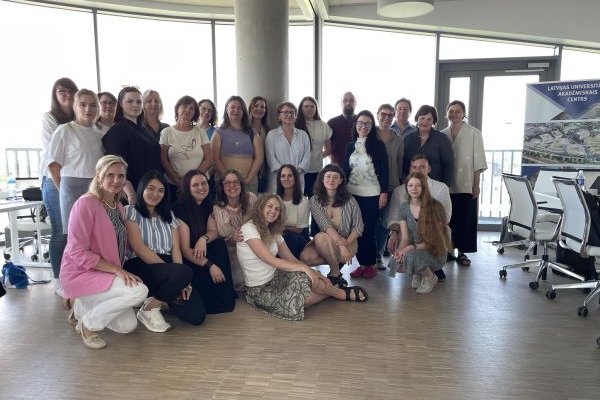
15 Lithuanian PhD students and researchers, together with colleagues from Latvia and Estonia, are participating in the European Educational Research Association (EERA) seminar on academic writing at the University of Latvia, Riga. The seminar is led by professor Stephen McKinney from the University of Glasgow and Dr Céline Healy from the University of Meinut. The seminar takes place in the new complex of the University of Latvia – a very modern and impressive architectural complex. The workshop teaches how to create a personal publication plan, how to understand and take into account the requirements of different journals, how to structure an article, how to take into account the comments of reviewers, etc. New publication trends are discussed (e.g. rejection of publications that use qualitative content analysis without explaining the type of content, publications on educational content, educational leadership, inclusive education, etc. must be based on the latest policy documents and research, as these are the fastest changing and most likely to be outdated topics). New professional friendships and partnerships are forgeding during the workshop.
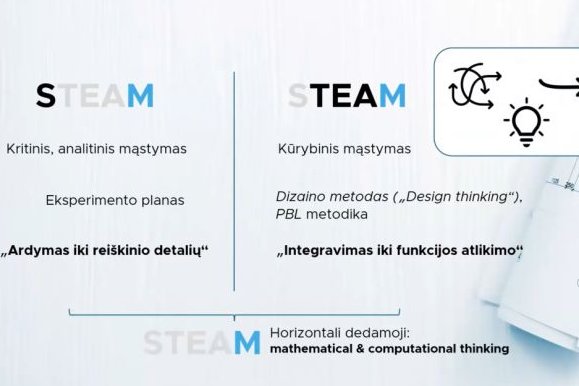
On the 23th of May, in 2024, the Education Forum “Problematic or Dialogical? STEAM Education in Relation to the Humanities, Social Sciences and Arts” was held.
In the Forum was considered the following issues:
What is STEAM education and what are its main objectives?
What is the current situation of STEAM education in Lithuania?
What models of STEAM education do we have and how do they work? What are the challenges?
What is the value of humanities, social sciences and arts in STEAM education?
What is the relationship between these strands in current educational practice?
What are the possible futures for education and the role of STEAM education?
During the education forum, the announcememt “Lithuanian STEAM Phenomenon: a Popular Challenge of Uncertainty” was presented by dr. Paulius L. Tamošiūnas (Head of VU Methodological STEAM Education Center). prof. dr. Rūta Girdzijauskienė (Lithuanian Academy of Music and Theatre, Klaipėda University) gave a presentation, “When Science Meets Art: the Interaction of Science and Arts in STEAM Education“. Dr. Simonas Šabanovas (Advisor of the Education Department of the Ministry of Education, Science and Sports) provided detailed insights on STEAM on a Lithuanian scale. Dr. Jogaila Vaitekaitis (VU Institute of Educational Sciences) and Asta Malčiauskienė (Panevėžys Education Center, principle) also participated in the discussion. The forum was moderated by prof. Dr. Lilija Duoblienė (Vilnius University). You can view the entire forum recording on LERA’s YouTube channel https://youtu.be/qep9NxhAdLs
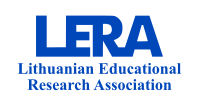
XXIII EDUCATION FORUM
EDUCATION FOR LITHUANIA – RESEARCH-BASED EDUCATION
TOWARDS RESEARCH-BASED EDUCATION AND TRAINING
Theme
“Problematic or Dialogical? STEAM Education in Relation to Humanities, Social Sciences and Arts”
We are kindly remind you that on Thursday 23 May 2024 from 3.00 p.m to 5.00 p.m. the Educational Forum “Problematic or Dialogical? STEAM Education in Relation to the humanities, Social Sciences and Arts”will be held.
We are kindly invite education practitioners, education and education researchers, masters students, doctoral students, university lecturers, education and social policy makers, representatives of scientific associations and NGOs, and all those who are interested in the implications of education research for educational practice.
The Forum will address the following questions:
What is STEAM education and what are its main objectives?
What is the current situation of STEAM education in Lithuania? What models of STEAM education do we have and how do they work? What are the challenges?
What is the value of humanities, social sciences and arts in STEAM education?
What is the relationship between these strands in current educational practice?
What are the possible futures for education and the role of STEAM education?
| Date | 23 May 2024 (Thursday) |
| Time | 3.00–5.00 p.m. |
| Translation | |
| Moderators | Prof. dr. Lilija Duoblienė, Vilnius University |
| Key-note speakers |
Dr. Paulius L. Tamošiūnas, Head of the VU Methodical STEAM Education Centre. Prof. dr. Rūta Girdzijauskienė, Lithuanian Academy of Music and Theatre, Klaipėda University |
| Panelists |
Dr Simonas Šabanovas, Adviser to the Department of Education, Ministry of Education, Science and Sport Dr. Jogaila Vaitekaitis, Institute of Educational Sciences, Vilnius University. Asta Malčiauskienė, Head of Panevėžys Education Centre. |
XXXIII Education Forum Scientific and Organising Committee
Assoc. prof. Sandra Kairė, Vice President of LERA
Prof. dr. Lilija Duoblienė, Member of the LERA Board
Dr. Eglė Pranckūnienė, LERA president
Contact information:
Associate prof. dr. Sandra Kairė, [email protected]
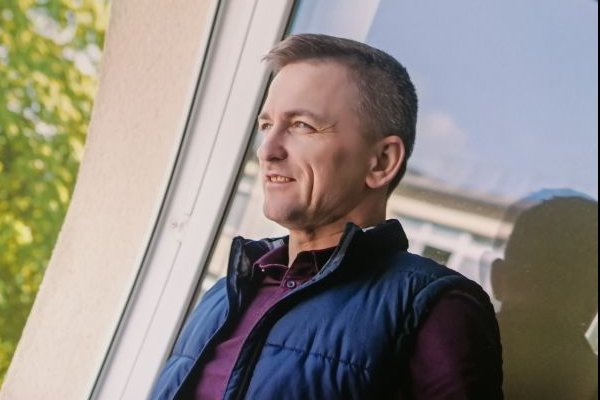
Congratulations to the new PhD Irmantas Adomaitis on the successful defence of his PhD thesis: The Effect of Educational Interaction on Cognitive, Social, and Digital Skills through Problem-Based Learning in Virtual Learning Environments (Education Sciences (S 007)) (supervisors – 2019-2021 doc. dr. Elena Trapulė, 2022-2023 prof. dr. Aušra Rutkienė, scientific advisor-prof. Erno Lehtinen) and ontaining a doctor’s degree of Social Sciences in the field of Education.
The dissertation is available at:
Vytautas Magnus University and Lithuanian National M. Mažvydas Library.
The dissertation is available at: 11 Studentų St., Akademy, Kaunas district.
The short annotation of the dissertation is presented bellow.
Learning based on active educational interaction can be considered as a distinctive model of teaching(s) for developing students’ cognitive and social skills and for achieving deep and meaningful learning, both in face-to-face and in virtual learning environments (VLEs). In the last decade, research on educational interactions in VLEs has focused on cognitive or social skills, as well as on the variety of digital tools and their application in VLEs. However, more in-depth studies focusing on the application of educational strategies or models in VLEs are scarce in the articles analysed between 2010 and 2023, and the field of research is not professional VLEs, but rather environments that are mostly limited to communication and collaboration in social networks. In other words, there is a lack of knowledge about the forms of educational interaction and their impact on students’ skills in learning VLEs.
The aim of the study is to reveal how educational interactions affect the development of students’ social, cognitive and digital skills in a virtual learning environment through problem-based learning in physics lessons.
The main ideas of social constructivism and connectivism are used to reveal the impact of educational interaction on students’ cognitive, social and digital skills in a problem-based learning VLE. The study opted for a sequential explanatory mixed-approach research design. A quantitative approach is used to assess students’ social, cognitive and digital skills before and after the study. The qualitative approach was chosen to find out what kind of educational interactions encourage students to engage in active interaction in the VLE, what kind of tasks or problem situations presented encourage students to engage in active interaction, and what kind of educational interactions are typical for students in solving the problems presented in the VLE. The participants in the dissertation activity study were pupils (n = 41) from grammar school classes I-II.
The results revealed that educational interaction in problem-based learning strategies in VLEs has not been a priority area of research in the last decade. The educational content in VLEs, based on social constructivism and connectivism, is shaping a new approach to teaching and learning, with educational interaction as its axis, which requires a ‘social presence’ in the implementation of cognitive activities in VLEs. The combination of educational interaction and problem-based learning strategies in the VLE is one of the key elements to unleash students’ thinking, to stimulate cognition and the willingness to learn together, to increase students’ motivation and to improve students’ academic performance. The evaluation suggests that the educational interaction of the problem-based learning strategy in the VLE has a positive and statistically significant impact on the development of students’ cognitive, social and digital skills.
Dissertation Defense Council:
Chairperson – prof. dr. Airina Volungevičienė, Social Sciences, Education S 007, Vytautas Magnus University.
Prof. dr. Nijolė Burkšaitienė, Social Sciences, Education S 007, Vilnius University,
Prof. dr. Valdonė Indrašienė, Social Sciences, Education S 007, Mykolas Romeris University,
Assoc. prof. dr. Lina Miltenienė, Social Sciences, Education S 007, Vytautas Magnus University,
Prof. dr. Marijaana Veemans, Social Sciences, Education S 007, University of Turku, Finland.

The International Summer School for Qualitative Research 2024 will take place at Vytautas Magnus University from 26-28 June 2024, via online.
This year we are celebrating sixth year anniversary ofthe Annual International Summer School on Qualitative Research 2024 at Vytautas Magnus University, Kaunas, Lithuania. This scientific event, like every year, is the result of cooperation with the School of Social Research.
Every year we receive participants from Europe, Asia, America, Australia. Internationality and scientific expertise are part of the reputation of our summer school.
We have a very strong tradition – we invite scientists with an exceptionally high scientific international reputation , who have many years of expertise in working with a specific qualitative research methodology. Our summer school has also other specifics – the material is never repeated and it is not focused on the basic level. Therefore, we invite applied researchers, scientists and doctoral students to learn together and co-create through their learning.
Being together and having different levels of understanding and skills in a specific methodology, the participants have the opportunity to exchange their experiences, discuss, and make intellectual decisions. There is always a direct opportunity to ask questions and get feedback from a specific scientist.
This year there will be three full days of intensive learning. On the first day, experts in qualitative research methodology will give lectures, and on the second and third days, there will be half-day seminars dedicated specifically to qualitative research methodology, where you will acquire knowledge and intellectual skills that textbooks do not emphasize.
This year, a novelty awaits you – we are starting the path of learning phenomenology methodology. This is the first year that this methodology will be incorporated into the summer school program. We are particularly proud of that.
This year, four scientists will share their experiences with you:
Grounded theory – Professor PhD Antony Bryant from Leeds Becket University, UK / Educational Research Institute, Vytatutas Magnus University, Lithuania
Phenomenography – Senior fellow, PhD Sanela Lazarevski from Leeds Becket University, UK
Ethnography – Senior Lecturer & Senior Researcher, PhD Laura Purdy from Liverpool Business School, Liverpool John Moores University, UK / Educational Research Institute, Vytatutas Magnus University, Lithuania
Methodological directions of writing qualitative research-based manuscripts – Professor & Head Researcher, PhD Vilma Zydziunaite from Educational Research Institute, Vytautas Magnus University, Lithuania / University of Silesia in Katowice, Poland
The summer school will be held in a format convenient for you – online. It means that you will reach us from at least one physical and geographical location where there is an Internet connection.
Please note and book important dates: 26-28 June 2024 for International Summer school on qualitative research at VMU.
Let’s meet soon.
https://svietimas.vdu.lt/tarptautine-vasaros-mokykla/
The information from Education Academy, Vytautas Magnus University
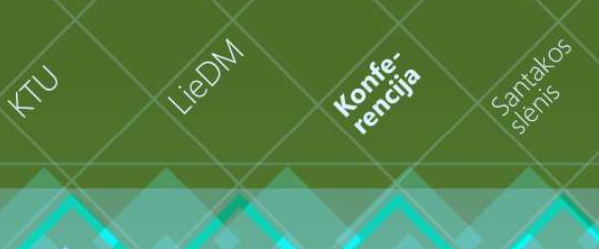
LieDM Consortium Conference “25 Years of the Distance Learning Network: Achievements, Challenges and Visions”.
We are delighted to invite you to participate in the impressive conference “25 years of the Distance Learning Network: Achievements, Challenges and Visions”, organised by the LieDM Consortium, which will take place on 16 May 2024 from 9:00 to 18:00 (KTU Santakos valley, 59 K. Baršausko St., Kaunas). This conference promises to be not only memorable but also extremely interesting.
We will have:
Expert discussions and presentations on advances in information systems and artificial intelligence.
An incredible concert that will be performed not only in the Santaka Valley, but also in several other parts of the country at the same time, creating a unique sense of space and music.
The unforgettable charisma and energy of the conference host Sakalas Uždavinys, who will draw you into the conference events with a smile and a touch of humour.
The debate will be moderated by the extremely interesting Ainius Lašas, who will invite you to share your insights and thoughts on our future – is artificial intelligence a friend or foe?
And that’s not all! During the breaks, there will be interactive stands in the foyer:
The VILIUSTECH car simulator will allow you to test your driving skills in virtual reality.
At the LMTA music stand, you will be able to test your hearing and musical talent.
The LUSH medical stand will give you the chance to learn life-saving procedures.
The Lithuanian University of Sport will invite you to ride a bicycle and discover the benefits of sport and health.
The event will be rounded off with a saxophone concert and a buffet where you can get to know the participants better and continue the discussion.
Conference programme here
Information from the Lithuanian Distance Learning Network LiedDM
Early Childhood Education Abroad: Experiences from the Netherlands and Ireland
Representatives of the kindergarten and pre-school network assoc. prof Sergejus Neifachas and lect. Nadia Venskuvienė participated in internships abroad. Assoc. prof. Sergejus Neifachas completed an internship at the University of Dublin, Ireland, and lect. Nadia Venskūnienė at Ultrect University, Holland. Both interns share their insights about educational practices in foreign countries, the peculiarities of preschool education teacher training, the specifics of preschool education and the possibilities of applying the acquired experience in the context of Lithuania.
You can find out more about their experiences visiting the preschool education subsite: https://lera.lt/iu/tinklo-nariu-patirtys-svetur/

Congratulations to the new PhD Agnė Daučianskaitė-Kubilevičienė on successfully defending her doctoral dissertation.
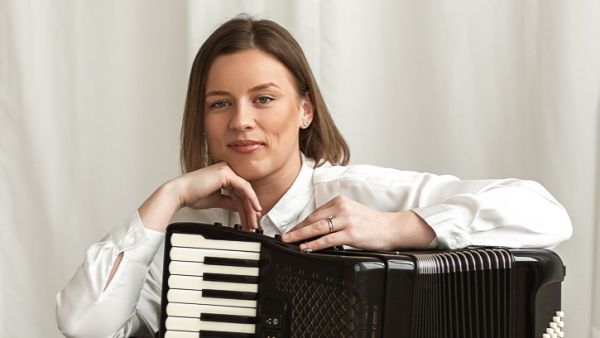
Congratulations to the new PhD Agnė Daučianskaitė-Kubilevičienė on the successful defence of her doctoral dissertation “Educator’s Leadership in the Educational Interaction with the Learner in the Development of Performers” (Education Sciences (S 007), supervisor – prof. dr. Vilma Žydžiūnaitė (Vytautas Magnus University, Social Sciences, Education, S 007) and on the completion of her PhD degree in the field of Educational Sciences.
The dissertation is available at:
Vytautas Magnus University and Lithuanian National M. Mažvydas Library
The dissertation is available at: 11 Studentų St., Academy, Kaunas district.
A brief annotation is presented below:
This study aims to illustrate and reveal the path of training a professional musician from music school to university, based on the concept of leadership in the educational process between the teacher and the learner. This dissertation research will also contribute to the development of scientific resources on professional music education at national and international level. The dissertation consists of four parts. The theoretical part analyses the general picture of artist education: it discusses the national and international context, describes the documents regulating the training of music performers, reveals the links between leadership and music education, describes the educational interaction between the teacher and the learner, and discusses the process of becoming a professional music performer. The methodology section of the research presents a hybrid methodology (bricolage), including thematic analysis and phenomenography. The philosophical paradigm of the two methodologies integrated in this thesis is identical. The philosophical basis of thematic analysis is descriptive phenomenology, which focuses on the lived experiences of the research participants (teachers, lecturers) that reveal their lived professional world (Sundler et al., 2019). The philosophical stance of phenomenography is also descriptive (interpretive) phenomenology (Marton, 1986). The methodology section of the research also introduces the sample of the empirical study, data collection, the research instrument, the methods of analysis, and informs about how research ethics were followed. The empirical part of the thesis discusses the results obtained in the study. The discussion part analyses the results of the study based on a hybrid methodology design that integrates thematic analysis and phenomenography with theoretical considerations. The thesis concludes with conclusions, recommendations and a list of references.
Dissertation Defence Council:
Chairperson – prof. dr. Asta Rauduvaitė, social sciences, education S 007, Vytautas Magnus University.
Prof. dr. Remigijus Bubnys, Social Sciences, Education S 007, Vilnius University, Šiauliai Academy;
Prof. dr. Vidmantas Tūtlys, Social Sciences, Education S 007, Vytautas Magnus University;
prof. dr. Rūta Girdzijauskienė, social sciences, education S 007, Lithuanian Academy of Music and Theatre, Klaipėda University;
dr. Laura Purdy, Social Sciences, Education S 007, Liverpool John Moores University, United Kingdom.
